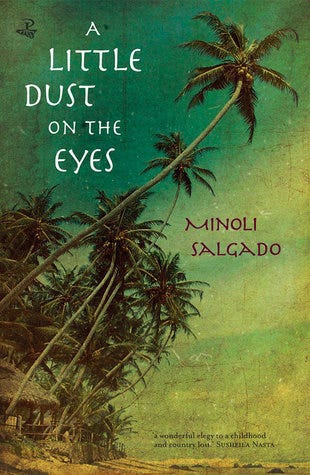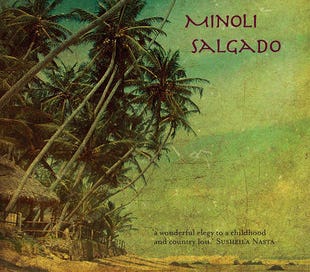A Little Dust on the Eyes by Minoli Salgado

Minoli Salgado's debut novel A Little Dust on the Eyes takes as its trigger a family wedding in Sri Lanka in late December 2004, which the reader knows is about to be disrupted by the Boxing Day tsunami. In the couple of weeks of calm beforehand, lonely PhD student Savi takes the opportunity to escape an English winter and try to reconnect with the family she left behind years ago.
The story is told with gentle insistence, and the vivid images juxtapose and mingle grey Britain with colourful, exotic Sri Lanka. We shuttle back and forth in time and place, from the south coast of England to the south coast of Sri Lanka, from the present day to points in Savi's childhood or the more recent past. Revisiting a place you remember doesn't necessarily match up with revisiting the memory, and if you've been away for long enough are you a visitor or going home? Memories, stories and truth - how closely are they connected, really?
Savi's struggling thesis has her studying her native land from afar, through literature. Her cousin Renu on the other hand, whose formal education was interrupted by the civil war, is studying recent history through the gaps and inconsistencies in what people say when they talk about relatives who disappeared during the war. The core of the novel is the connection and contrast between these two women, practically sisters in childhood, whose lives have then been so different. One sent to an English boarding school, out of harm's way but also out of family life, the other growing up in a community turning against itself, where everyone turns a blind eye and no-one wants to know the truth, just in case.
Dr Salgado lectures in English at the University of Sussex, and this academic background comes through via technicalities in Savi's research, as well as the list of references at the end of the novel. Interestingly I felt almost cheated when she acknowledged the real source of a couple of quotes she puts in characters' mouths, yet I assume (and probably expect) novelists in general are poaching dialogue left, right and centre, from a choice phrase at a bus stop to a neat summary sentence on the news. I know I do it now and then.
A minor niggle for me was the lack of a sense of timescale in the book - I wasn't altogether sure how long it had been since Savi last visited Sri Lanka, or had seen her cousin, how long she'd lived in England or even how long Renu had been unofficially working with the NGO investigating abductions. That aside, I was captivated by A Little Dust on the Eyes and I imagine anyone who liked Romesh Gunesekera's Noontide Toll (see my review here) would also enjoy it.



